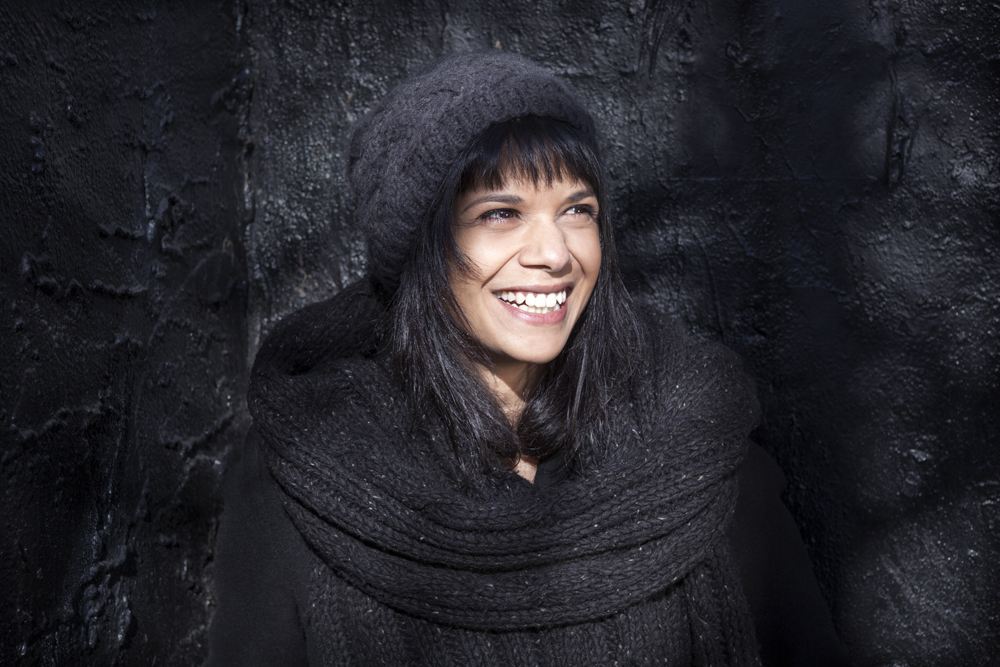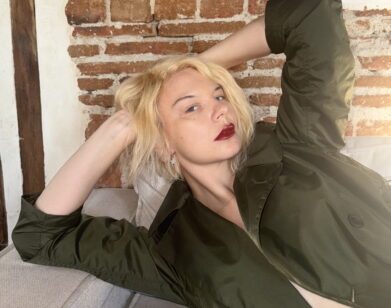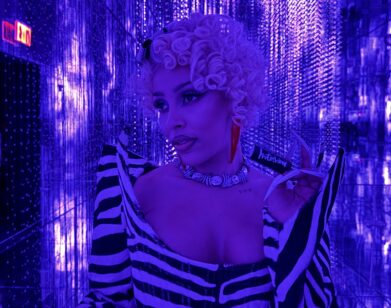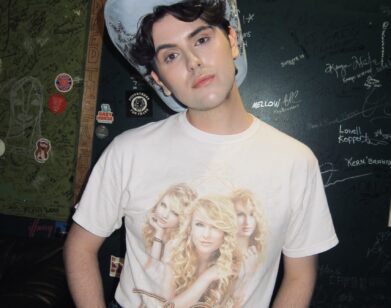Shilpa Ray on Stretching and Screaming
Most articles about musician and singer Shilpa Ray beging with her introduction to rock music. It’s a good story: Ray is a rock autodidact. Growing up in New Jersey, Ray’s conservative parents prohibited pop music in the house and encouraged their daughter to study Indian classical music and the harmonium. Ray’s musical awakening was not until middle school when, inspired by the recent popularity of Oliver Stone’s The Doors, she began to read musical biographies. One day she found a copy of the Velvet Underground’s debut album at the local library. “That changed everything,” Ray explains.
But there is more to Shilpa Ray than a cute coming-of-age story. A powerful vocalist and skilled lyricist, Ray’s last album with her band Her Happy Hookers, Teenage and Torture, is filled with belting anguish. She’s not afraid to be polemic or political. The video for her first single from her next album (not with the happy hookers), “Nocturnal Emissions,” proposes a masturbation-free world in which it is not just every zygote that is sacred, but every ejaculated sperm. She scoffs at the topic of modern indie music, elaborating that “indie music thinks it’s better than it is—they didn’t reinvent capitalism, they didn’t reinvent the economy. The only difference is the amount of money being put into it.” When asked about her favorite self-penned lyric she quotes one of her new songs: “With my tail between my bleeding ass, I’m off to the gates of heaven.” The lyric, she explains, is a reaction to visiting Nepal and witnessing the corruption of organized religion,”what Jews and Christians are always talking about here.”
If Ray met a middle-schooler with an upbringing similar to her own today, she’d tell them to listen to Love’s Forever Changes (1967) and Velvet Underground’s later album Loaded (1970). “Lou Reed must make himself laugh. His crazy characters, Lonesome Cowboy Bill—who is that?” says Ray over coffee in New York. “It’s like country music on Broadway. In 1970 everyone was on this country music kick, as opposed to psychedelia, which had happened a few years before. The Velvet Underground, the Stones… The Eagles. I hate The Eagles, but I’ve got to give them that.”
EMMA BROWN: I love your video for “Nocturnal Emissions.” I’ve sent it to all of my friends.
SHILPA RAY: Oh, that’s so cool, thank you! That was a lot of fun to do. It was the first time I ever tried doing that, trying to put something together that wasn’t necessarily musical. My friend, Maria [Gigante], she’s a director from Chicago, she just taught me and gave me a crash course. We’d chat on the phone like, “How do I do this? How do I cast? How do I budget?” She kept coaching me the entire [time]. It was a really wild experience.
BROWN: You used Kickstarter to fund the video; had you ever done that before?
RAY: No. All of that stuff was going on with Todd Akin and the Republican Party, we weren’t sure. I never thought Romney had a chance, but you never know, because I didn’t think Bush ever had a chance. When you live [in New York City] especially, you’re in a bubble. Even if [New Yorkers] are Republicans, the Republicans here make a little more sense to me—when they talk about money, the way the budget is supposed to work. But that stuff was crazy. I am notorious for putting up posts on Facebook that normal people should not put up, because you invite a lot of political arguing—I have a big mouth—so that’s what I did. My question was: “What would it be like if men were constantly the subject of political debates in terms of their reproductive rights?” And [my friend’s] response was, “What if there was a ban on jerking off?” And I thought about it for an hour, and I was like, “We have to make a video.” I thought, No, I’m gonna sleep it off and I’m not going to want to do it tomorrow. I wrote to two of my really good friends in the middle of the night: “I have this crazy idea, talk me out of it tomorrow morning.” Tomorrow morning rolls around and they’re like, “Yeah, we’re down, we’ll do it.” We made the funds in four days; it was really nice, the support we got.
BROWN: Did you have to explain what you were going to do do?
RAY: I said it had a political twist to it, but I didn’t want to give it away, I didn’t want to say too much.
BROWN: Have you finished working on your next album then?
RAY: No. It’s at a mixing stage, which can mean a lot of things. I’ve been self-financing so far, so it’s a little slower than if somebody had put up a large sum. I’m going with what I can earn and put into it, as I do it. Mixing is daunting; it’s like working with a canvas, but you can’t see it all together. You have to make the same kind of landscape, and everything has to have a part. It takes a while, especially when you’re trying to make decisions, you second-guess yourself a lot. I have never had to make the final decisions in this way, you’d have a producer or somebody to do that. So, I just call [my friends] up and I ask them and I irritate them.
BROWN: What made you decide to do it yourself?
RAY: I went on a long tour around spring, summer 2011, after Teenage and Torture came out—the album I did with the Happy Hookers. I wanted a different sound. I just remember going through show after show, and being like, I don’t really feel like screaming tonight. Why do I have to scream? Why does this have to be so loud? But also because when I had opened solo for Grinder Man the autumn before, Nick Cave actually pulled me aside and was like, “What are you doing? What are you doing with your songs? You need to sit down and really think about how you’re arranging music.” And I was like, “No, it’s rock-‘n’-roll. I don’t really want to think about it.” I carried his advice with me for a while.
BROWN: Were you offended?
RAY: No, I wasn’t. Because I knew who was talking to me—I listened to so much of his catalogue, I respect him so much—so I knew what he was saying to me.
BROWN: On the subject of screaming, how do you save your voice?
RAY: You have to do exercises. It’s like when you’re playing sports or dancing, you have to stretch and you have a routine before going in. Even if you’re playing guitar or bass instruments, you have to do muscle stretches before you go live. Because you have to keep going, there’s no stopping at that point. With vocals, you have to make sure you have enough spit and drool in your mouth and your throat so you’re not scratching a dry muscle. It always has to be lubricated some way.
BROWN: Is the next album not with the Happy Hookers?
RAY: Yeah, it’s me and a bunch of my friends. I kind of worked it the opposite way, where we dove into making this record, but I didn’t really form a stable band or play live continuously like I had always done. Whenever I had written a song, I’d play it live to death before I’d go into the studio. This time around I just did it the other way, where we’re recording a record. It’s way easier to figure out what arrangements are working and what isn’t working when you record first and then play live later. But, I don’t know, there are some pluses and minuses to that. There are some things I like about it and some things I don’t.
BROWN: I know you met Nick Cave through Larry Sloman [“Ratso”]. And I read the through the interview where he gave your CD to Lou Reed and Bob Dylan as well.
RAY: Oh, yeah, that was funny. [laughs]
BROWN: Nick Cave is a huge fan, but did you ever get feedback from Lou or Bob?
RAY: No. I never thought I’d ever get feedback from Nick—that was crazy. I met Ratso after doing a Sly Stone tribute concert over the summer. I met him outside, he seemed like a really cool guy, and we just hit off. We just became friends very instantly. He was like, “Yeah I’ll give it to my friend so-ans-so,” and I was like, “Yeah, whatever.” Then he was lik, “Nick’s in town, and he was talking about your stuff and he wants to meet you.” Then he actually came to the store… I used to work across the street, at AG. He came into the shop with his two little boys, and I thought I was going to just die. That was the guy I listened to when I was a teenager: What are you doing in this shop I’m working in? It was so crazy. But he’s a really cool guy. He’s also a very straight shooter, he’ll tell you exactly what he thinks about something and he’s not going to blow smoke up your ass. [laughs].
BROWN: So, how would you describe your music?
RAY: A work in progress. [laughs] I know what I like. I also know that it definitely has an East Coast vibe to it, I can hear that. I was born and raised in Jersey, I’ve lived [in New York] for 12 years, it’ll be my 13th in April. I’ve just lived in this corner of the country for so long. It sounds like East Coast music to me.
BROWN: Do you still listen to music in your spare time? Or do you find it exhausting?
RAY: That’s a good question. Both. I didn’t like listening to music, especially last summer and over the fall, and have recently started putting my iPod back in the dock. I get totally sick of it, I get sick of hearing myself, I get sick of sounds. Where I work they’re constantly spinning stuff, so I’m like, “Oh the silence, I need silence! Where’s the silence?”
SHILPA RAY IS PLAYING TONIGHT, JANUARY 15, AT PIANOS IN NEW YORK. FOR MORE INFORMATION, VISIT HER FACEBOOK PAGE.







